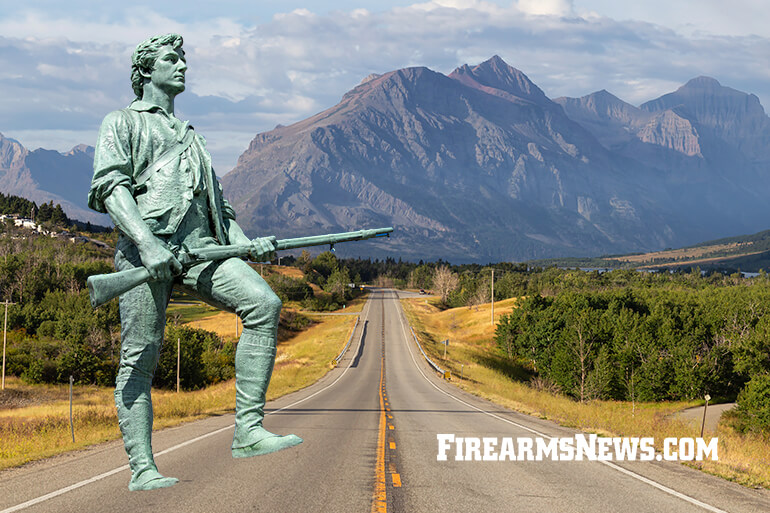We are an online gun store in Helena, MT. We offer a good selection of firearms, ammo & accessories at competitive prices. We also transfer firearms & charge $20 per transfer. We also transfer NFA firearms and charge $75 per transfer. Read more...
Montana Command Authority Bill Raises Founding Intent Militia Concerns
April 6, 2021
(updated April 25, 2021)
Published by firearmnews
A bill pertaining to control of armed forces in Montana has passed through the legislature with little fanfare. HB 31, a bill short-titled “Clarify Terminology on Military Titles and Command Authority,” received just short of unanimous bipartisan support in both the House and the Senate.
“The adjutant general is the commanding general of military forces of the state,” the act reads.”
What are those forces? HB 31 author Rep. Ed Buttrey explained as he introduced it in a House State Administration hearing in January. The bill, he explained, “was brought forth at the request of the Department of Military Affairs.”
“As we all know, members, the governor is commander in chief of the military in the State of Montana, and this includes what’s called the organized and unorganized militia,” Buttrey related. “It’s the intent of House Bill 31, for the unity of command, to have a single military officer in charge of all militias without having to create that unity of command at the governor’s office in time of crisis.”
Montana Code 10-1-103 states:
“The classes of the militia are:
(1) the organized militia, which consists of the national guard and the Montana home guard;
(2) the unorganized militia, which consists of the members of the militia who are not members of the organized militia.”
Further, The Constitution of the State of Montana, Article VI, Section 13. declares:
“(1) The governor is commander-in-chief of the militia forces of the state, except when they are in the actual service of the United States. He may call out any part or all of the forces to aid in the execution of the laws, suppress insurrection, repel invasion, or protect life and property in natural disasters.
(2) The militia forces shall consist of all able-bodied citizens of the state except those exempted by law.”
Significantly, Montana Code Annotated 2-15-1202 requires:
“The adjutant general must … have the rank of major general…”
That means he holds a commission in the U.S. military. And that means the “unorganized militia” by law is ultimately commanded by an adjutant general whose first loyalty is to the federal government.
Of note is that Montana has no state defense force. Per U.S. Code:
“In addition to its National Guard, if any, a State … may, as provided by its laws, organize and maintain defense forces. A defense force established under this section may be used within the jurisdiction concerned, as its chief executive (or commanding general in the case of the District of Columbia) considers necessary, but it may not be called, ordered, or drafted into the armed forces.”
That’s a significant distinction from what the adjutant general commands as shown by the Supreme Court’s 1990 decision in Perpich v. U.S.:
“… Congress may authorize members of the National Guard of the United States to be ordered to active federal duty for purposes of training outside the United States without either the consent of a state governor or the declaration of a national emergency.”
Without a state defense force, if there is any conflict in orders to the adjutant general from the governor and from the Department of Defense, the DoD will prevail. The adjutant general and all those in his command, including the unorganized militia, are required to ultimately serve the Pentagon. Now recall who requested HB 31.
From the perspective of the language of the Second Amendment, which specifically cites “the security of a free State,” a conflict with Founding intent appears irreconcilable.
While the Constitution provides for the federal government to “govern… such Part of them as may be employed in the Service of the United States,” that qualifier proved problematic for those who viewed the Militia as enforcers for whatever they wanted to do, as became apparent in the War of 1812, when “The governors of Massachusetts, Connecticut, and Rhode Island refused to order out Militia except for the defense of their respective States.”
Nullification was not a power that applied only to juries. It goes to the heart of refusal to obey orders deemed unlawful. James Madison, in Federalist No. 46, anticipated not just nullification on the part of the Militia, but outright resistance if warranted:
“Let a regular army, fully equal to the resources of the country, be formed; and let it be entirely at the devotion of the federal government; still it would not be going too far to say, that the State governments, with the people on their side, would be able to repel the danger.”
Amplifying that conviction, and showing it was accepted sentiment as opposed to an extreme outlier, was Supreme Court Justice Joseph Story, who wrote in his commentaries:
“The militia is the natural defence of a free country against sudden foreign invasions, domestic insurrections, and domestic usurpations of power by rulers. It is against sound policy for a free people to keep up large military establishments and standing armies in time of peace, both from the enormous expenses, with which they are attended, and the facile means, which they afford to ambitious and unprincipled rulers, to subvert the government, or trample upon the rights of the people. The right of the citizens to keep and bear arms has justly been considered, as the palladium of the liberties of a republic; since it offers a strong moral check against the usurpation and arbitrary power of rulers; and will generally, even if these are successful in the first instance, enable the people to resist and triumph over them. And yet, though this truth would seem so clear, and the importance of a well regulated militia would seem so undeniable, it cannot be disguised, that among the American people there is a growing indifference to any system of militia discipline, and a strong disposition, from a sense of its burthens, to be rid of all regulations. How it is practicable to keep the people duly armed without some organization, it is difficult to see. There is certainly no small danger, that indifference may lead to disgust, and disgust to contempt; and thus gradually undermine all the protection intended by this clause of our national bill of rights.”
The combination of ambitious and unprincipled rulers with indifference from the American people points to how we got to where we are today, and shows how “Ignoring Core Purpose Makes the Second Amendment Vulnerable to Infringements” (see Part 1 and Part 2 from the back issues of Firearms News. Print edition readers can search this title on our website at FirearmsNews.com].
Another fundamental disconnect with Founding intent has been pointed out by Constitutional scholar Dr. Edwin Vieira who maintains that the “unorganized militia” of United States Code (and Montana’s) is in itself an example of Congressional “malfeasance… beyond the pale.”
“Under no circumstances may Congress leave the Militia unorganized, unarmed, or undisciplined–let alone knowingly and intentionally impose such conditions,” Vieira instructs. The very term is “an oxymoron,” he declares.
That should be evident since the Founders deemed it “necessary to the security of a free State.”
Other considerations also pose a threat to the independence of “the Militia of the several States.” In today’s “cancel culture,” it’s obvious that top military brass is kowtowing to the politicians and purging from their ranks any and all tarred as “extremists” by Democrats getting their smear points from leftist influencers like the Southern Poverty Law Center. It’s not all that far-fetched to wonder if the very “unorganized militia” members currently preparing and training to come to the defense of their communities would be deemed “undesirables” in addition to “deplorables.”
With Democrats unable to conceal the citizen disarmament feeding frenzy they engage in every time they capture the White House and gain majorities in Congress, it’s not inconceivable to speculate that being drummed out of the Militia could have the same effect as a dishonorable discharge in terms of being declared a “prohibited person.” Remember, these same Democrats want to add “haters” to the “red flag” list, and according to a growing meme being pushed by a Vanderbilt University psychiatrist and sociologist, and eagerly spread by a cheerleader media, racism is at the heart of the insistence to keep and bear arms.
A source estimates approximately 2,600 personnel in Montana’s combined Army and Air National Guard, somewhere between battalion and brigade-sized under the command of a lieutenant colonel or colonel. That a major general is required raises the question of if that increases the likelihood that future command will more than likely be under imported outsiders. While the majority of personnel alternate between National Guard duties and their civilian lives, the adjutant general, full time command and staff are bound to DoD with no room for potentially conflicting state concerns.
The Montana Shooting Sports Association has twice had a bill before the Legislature to refurbish and rev up the Montana Home Guard, written specifically to keep the Home Guard separate from the National Guard and any federal command. The last time the bill was introduced (unsuccessfully) was 2015.
“It is because of my long-term desire to have an active Home Guard in Montana that is separate and disconnected from the National Guard that I find it worrisome for HB 31 to place the Home Guard (even if currently nonexistent) under the command of the Adjutant General, who’s senior loyalty is to the DoD per Perpich v. US., MSSA President Gary Marbut tells Firearms News. “The simple amendment to HB 31 that would correct this problem would be to strike the words ‘military forces’ in Section 1 of HB 31 and replace those with “national guard.’ That would accomplish what proponents say they intend for HB 31, but no more.”
Who could object, and more importantly, why would they?
In the hearing for HB 31 referenced above, the new adjutant general, Major General John “Pete” Hronek characterized the bill as a simple measure to clarify lines of authority for military discipline, and also said that other states (specifically naming Utah and Idaho among them) have passed or are passing similar bills to ensure command authority. It would be interesting for national state gun owner rights groups with the resources and legislative contacts to look into the concerns raised here and make sure that “simple measure” doesn’t sweep away the ultimate failsafe the Founders built into the system they bequeathed to Posterity.
About David Codrea:

David Codrea is the winner of multiple journalist awards for investigating/defending the RKBA and a long-time gun owner rights advocate who defiantly challenges the folly of citizen disarmament. In addition to being a regular featured contributor for Firearms News and AmmoLand Shooting Sports News, he blogs at “The War on Guns: Notes from the Resistance,” and posts on Twitter: @dcodrea and Facebook.






Leave a Comment!
Comments